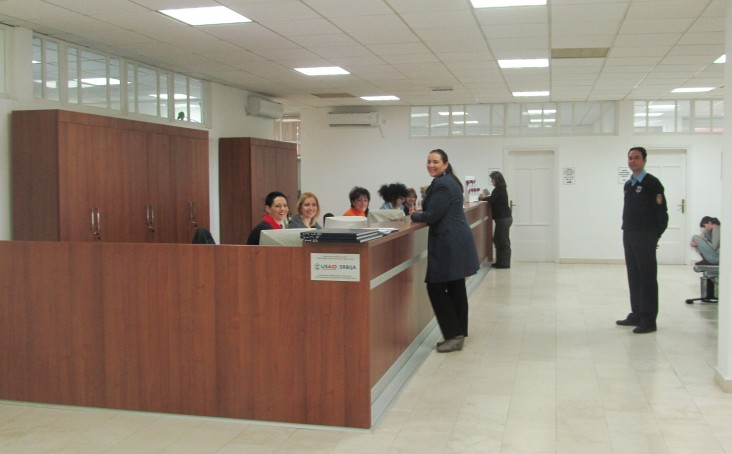
Aug. 2014—In 2012, the misdemeanor court in Zrenjanin, Serbia, was an eyesore. The roof leaked, the interior was dingy and the offices were extremely overcrowded.
Through the joint efforts of USAID’s Judicial Reform and Government Accountability (JRGA) project and the Ministry of Justice, the court underwent a complete renovation in the summer of 2012 and was transformed into a modern, clean space with ample courtrooms and judges’ chambers to accommodate both judges and court users. Now the public and administrative functions of the court are clearly separated, and signs—in all four languages in official use in Zrenjanin—direct people where they need to go, leaving room for staff to carry out their administrative tasks more smoothly.
The response to the facility upgrade has been overwhelmingly positive, with court users citing a marked improvement in efficiency and speed.
“I was very satisfied with finding one place where I was able to get responses to all the questions I had and submit my filings without knocking on five different doors, as was the case before,” said one citizen in Zrenjanin. “Direct communication with court staff without visible barriers, in an open and modern setting, made my experience in this misdemeanor court more comfortable and pleasant.”
Misdemeanor courts only became part of the Serbian judiciary in 2010. For years, under the jurisdiction of local governments, they were plagued with inadequate working conditions, inefficient procedures and a lack of credibility. In 2011, USAID launched the JRGA project with the goal to improve the condition of the misdemeanor and administrative courts, integrate them with the Serbian judiciary, and build public trust.
JRGA focused significant efforts on adopting the new Law on Misdemeanors, which went into effect March 1, 2014. The Law includes mechanisms for improved service of process and more efficient misdemeanor proceedings, such as the misdemeanor order, the plea agreement and alternative sanctions, as well as the registry of sanctions and unpaid fines. These provisions, among others in the Law, have already begun to improve the collection of court fees and fines, generating more revenue for the state.
Better working conditions are an integral part of improving the misdemeanor courts. To date, USAID has successfully carried out 10 facility upgrades in misdemeanor courts across Serbia—Arandjelovac, Valjevo, Kikinda, Zrenjanin, Zaječar, Loznica, Ruma, Prokuplje, Novi Sad and Šabac. These upgrades range from smaller-scale initiatives that better organize already functioning parts of the court to full renovations of the premises. Regardless of the scale, USAID’s goal is the same: Create a more functional and transparent space for both staff and users.
These facility upgrades have improved working conditions for judges and court staff; created safe and open hearings and more adequate space for maintaining court archives; and improved public spaces in courts. In particular, establishing “one-stop-shop” information and intake counters in misdemeanor courts has become a trademark of USAID’s facility upgrade efforts.
These one-stop-shops allow court users to complete all administrative tasks at one place in the court while obtaining quick and easy access to the status of their case. Administrative staff servicing the counters have become “the face” of particular courts, and their demeanor and customer relations skills play a key part in the court users’ perception of the court’s openness and transparency.
An upgrade in the misdemeanor court in Novi Sad in early 2014 had a significant impact on how the second largest misdemeanor court in the country carried out its daily operations. The court lacked an organized intake office, centralized record keeping and an appropriate storage place for archives. As a consequence, it took almost a month for a new case to be assigned to a judge, often causing more delays in procedure, and sometimes even leaving cases unassigned until they reached the statute of limitations for initiating a misdemeanor procedure.
Thanks to the facility upgrade, the Novi Sad court has centralized its active records and assigns cases within a day of receiving the misdemeanor filings. Registry clerks have access to the status of each active case at their fingertips. And court archives are now neatly organized in rows of shelves, properly numbered and labeled, and timely cleared of any obsolete materials.
Currently, the Ministry of Justice and USAID have turned their attention to the Belgrade Misdemeanor Court, the largest misdemeanor court in the country, which operates from 14 different locations across the city. The goal will be to successfully consolidate work spaces for over 400 judges and staff in a single venue to streamline business procedures, improve access to safe and open hearings, and contribute to significant savings in courts’ operational costs.
The JRGA project is scheduled to end in May 2016.
LINKS
Follow @USAIDSerbia, on Facebook, on YouTube







Comment
Make a general inquiry or suggest an improvement.